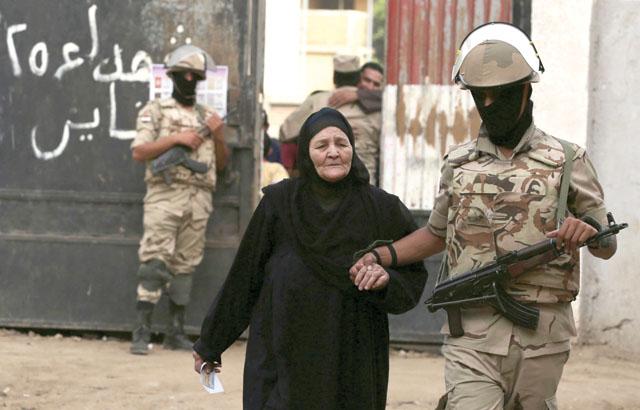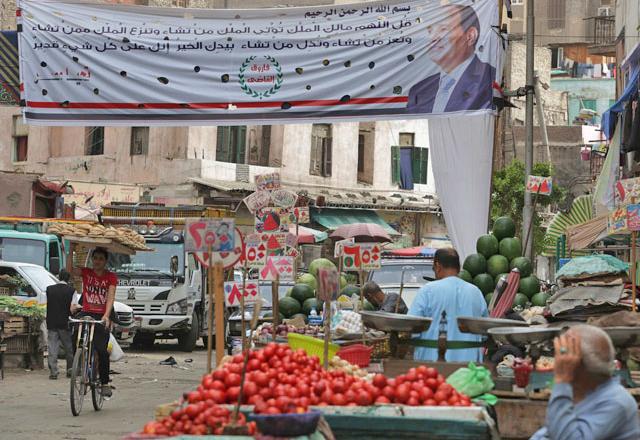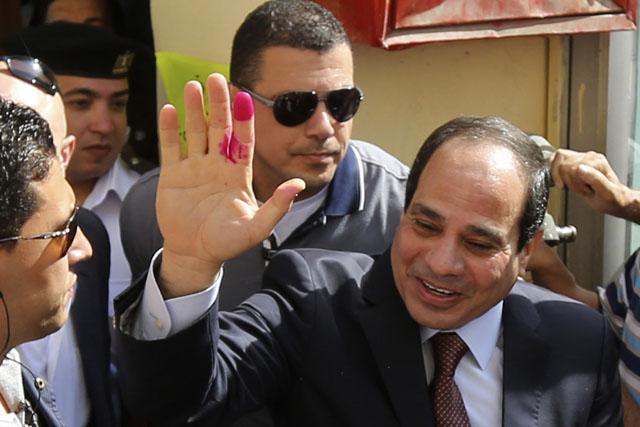You are here
Egypt extends presidential election to help Sisi
By Reuters - May 27,2014 - Last updated at May 27,2014

CAIRO — Egypt’s presidential election was extended by a day on Tuesday in an effort to boost lower than expected turnout that threatened to undermine the credibility of the front-runner, former army chief Abdel Fattah Al Sisi.
After Sisi called for record voter participation, low turnout would be seen at home and abroad as a setback for the field marshal who toppled Egypt’s first freely elected leader, the Muslim Brotherhood’s Mohamed Morsi.
The two-day vote was originally due to conclude on Tuesday at 10:00pm (1900 GMT) but was extended until Wednesday to allow the “greatest number possible” to vote, state media reported.
Sisi faces only one challenger in the election: the leftist Hamdeen Sabahi, who came third in a 2012 vote won by Morsi and was seen as a long-shot in the race against an army man who became popular after ending Morsi’s divisive year in office.
“I was going to vote for Sisi because he will be the president anyway, and because I was grateful to him for removing the Brotherhood from power,” said Hani Ali, 27, who works in the private sector.
“But now I won’t go as I felt people are unhappy with the chaos of the past months and are not as pro-Sisi as I thought.”
Lines outside polling stations in various parts of Cairo were short, and in some cases no voters could be seen on Tuesday, the second day of voting that had already been extended once, with polls originally due to close at 9.00pm.
Showing signs of panic, the military-backed government had launched a determined effort to get out the vote, declaring Tuesday a public holiday.
The justice ministry said Egyptians who did not vote would be fined, and train fares were waived in an effort to boost the numbers. Local media loyal to the government chided the public for not turning out in large enough numbers.
One prominent TV commentator said people who did not vote were “traitors, traitors, traitors”.
Al Azhar, a state-run body that is Egypt’s highest Islamic authority, said failure to vote was “to disobey the nation”, state TV reported. Pope Tawadros, head of Egypt’s Coptic Church, also appeared on state TV to urge voters to head to the polls.
Turnout in the 2012 election won by Morsi was 52 per cent — a level this vote must exceed for Sisi to enjoy full political legitimacy, said Hassan Nafaa, a professor of political science at Cairo University.
Were it to fall short, then he will have failed “to read the political scene and his miscalculation has to be corrected through reconciliation”, he said. Sisi had called for a turnout of 40 million, or 80 per cent of the electorate.
Distancing Sisi from the vote extension, his campaign announced he had objected to the decision.
Hero to some, villain to others
Sisi’s supporters see him as a decisive figure who can steer Egypt out of three years of turmoil. He became a hero to many for removing Morsi after mass protests against his rule. But the Islamist opposition sees him as the mastermind of a bloody coup, and a broad crackdown on dissent has alienated others.
Trying to lower sky-high expectations in the run-up to the election, Sisi had stressed the need for austerity and self-sacrifice, a message that cost him some support and drew some ridicule in a nation of 85 million steeped in poverty.
He had announced his priorities as fighting Islamist militants who have taken up arms since Morsi’s removal, and reviving an economy battered by more than three years of turmoil that has driven away tourists and investors.
“He is the man of the hour, a man of decision, he is a nationalist and clean man,” said Fatima Boultiya, a woman in her 60s voting in Cairo at a mostly deserted polling station.
Radwa Abu Al Azem, a 31-year-ld writer voting at the same polling station for Sabahi, said: “We don’t want Sisi. We don’t want military rule, we want a civilian state after 60 years.”
Sisi was widely seen as the most powerful figure in the interim government that has waged a bloody crackdown on the Brotherhood, declaring it an enemy of the state, and putting its leaders on trial on charges that carry the death penalty.
He had been lionised by state and privately owned media, which have helped build a personality cult around the former intelligence chief about whom little was known until last year: his face now appears on chocolates, posters and key-rings.
On Sisi’s Facebook page, admirers posted hundreds of pictures of themselves wearing Egyptian flags or patriotic T-shirts, with ink on their fingers to show they had voted for him. Others had banners saying “long live Egypt”, Sisi’s slogan.
He is the sixth military man to run Egypt since the army overthrew the monarch in 1952.
The Muslim Brotherhood and its Islamist allies had called for a boycott. The security forces killed hundreds of Morsi’s supporters and arrested an estimated 20,000 activists, most of them Islamists, in a crackdown since his removal.
Some secular dissidents have also been jailed, often for breaking a new protest law criticised as a threat to free assembly, alienating some liberal Egyptians who were glad that Morsi was overthrown.
In Morsi’s home village, northeast of Cairo only a few voters had cast ballots at two polling stations visited by Reuters on Tuesday afternoon, election officials said.
A poster declared Morsi still the legitimate president of Egypt, urging voters to boycott “the elections of blood”, while graffiti attacked Sisi as a traitor and killer.
Morsi’s Muslim Brotherhood has been declared a terrorist organisation by the state, which accuses it of a role in attacks that have killed several hundred members of the security forces. The Brotherhood denies any role in the violence.
Western criticism
It is the second time Egyptians are electing a president in two years, and it is the seventh vote or referendum since 2011.
In the Mediterranean city of Alexandria, a Muslim Brotherhood leader in her 40s welcomed the low turnout.
“This boycott gives us hope that Sisi will not be a real president and be able to govern,” she said, declining to give her name for fear of arrest.
But Sisi, 59, enjoys the backing of many Egyptian Muslims attracted by his pious demeanour — he has presented himself as a defender of Islam — and Coptic Christians whose churches were attacked after Morsi’s downfall and who see him as a protector.
Sisi’s challenger Sabahi came third in the 2012 election won by Morsi. Other candidates in that election did not run this time, saying the climate was not conducive to democracy following a crackdown on Islamist and other opposition groups.
Sabahi’s campaign complained of many violations, including physical assaults on its representatives, and “intervention by police and army”, on the first day of voting.
In the industrial city of Helwan, south of Cairo, many men sitting in coffee shops said they were not voting.
“I’ve voted plenty of times,” said one, a 59-year-old security guard at a factory who refused to give his name.
Related Articles
Egyptians cast their votes in a presidential election on Wednesday that is certain to install former army chief Abdel Fattah Al Sisi as president, but his call for an overwhelming mandate did not appear to have been heeded by voters.
Egyptian expatriates began lining up Thursday at polling places in more than 100 countries to cast ballots in four days of voting for Egypt’s coming presidential election.
Egyptians voted for a new president Monday in an election expected to sweep to power the ex-army chief who overthrew the country’s first democratically elected leader and crushed his Islamist movement.















